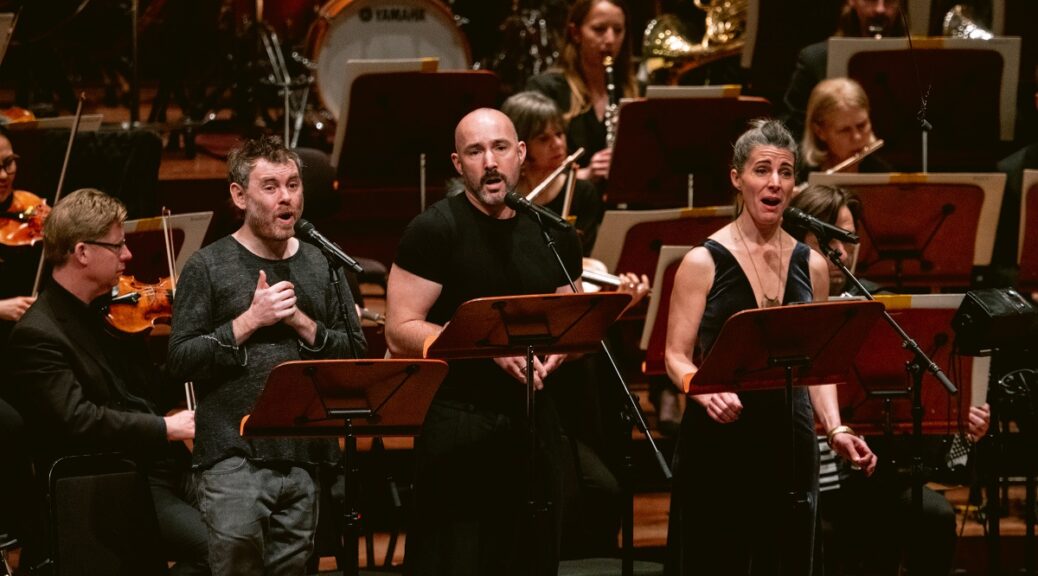
A CHALLENGING T-SHIRT NIGHT AT THE SYMPHONY
The nonconformist composer Gabriel Kahane, 41, unreeled a powerful iconoclastic message in Davies Hall, where politics is normally taboo. His abrasive oratorio may have left the walls trembling from the bitterness of his counter-culture poetry.
Kahane’s “emergency shelter intake form“ (sic) brought to mind other protest-movement works we’ve run into previously——-from Weill-&-Brecht musical theater, to the incendiary Berkeley rhetoric of the anti-establishment 1960s firebrand Mario Savio, to the gentler saga of John Adams’ “El Niño,” the Nativity story as seen through the lens of poor modern-day migrants traveling to America trying to be coping, coping, coping.
Certainly Kahane’s message was timely to the core, as communities are coping with the too many homeless residents and very few spots to camp. And the audience of symphony subscribers, not exactly below the poverty line on average, was one plausible target for Kahane’s shocks.
Assuredly the S.F. Symphony patrons had rarely encountered such a strong spur as Kahane’s, couched in deceptively understated terms. The success of his venture will depend whether such audiences take it personally, or see it as a tolerable, impersonal venture to be viewed at arm’s length, like “Fidelio” or “Tosca.” It was the former on Feb. 2, with no infuriated listener I saw brandishing umbrella or cane to threaten neighbor or performer.
The composer (son of the noted conductor Jeffrey K.) had learned a lesson familiar to artists from Bach to Fauré: The heavier the musical message, the lighter the musical touch.
Kahane’s dual message dramatizes the poverty of the homeless dealing with gimlet-eyed, heartless bureaucracies, as well as the growing income disparities in America. And, to galvanize any listener’s reaction into movement, lobby displays by social services on opening night at Davies offered feasible charitable actions that attendees could undertake on their own. And in the milieu of homelessness, the undertaker is never very far away.
For the S.F. Symphony, this was one of their boldest steps in years. Whether or not you embrace his message, the Symphony clearly believes in serving ALL of its community.
Tranquil voices dominated, with the hodge-podge of instruments (not all symphonic) subordinate. This 2018 work dramatizes via a serene soprano (Alice Hall Moran) and a vocal trio with T-shirts called the (Greek?) Chorus of Inconvenient Statistics, all amplified. By blithely reciting impersonal queries on a form for the unsheltered poor, they point out how unsympathetic government and society appear to be to their plight, with texts like
“We don’t wanna have our windows barred.
“Anywhere else is fine.
“But not in my backyard.”
Not for the squeamish! It was all poured out, more than 800 lines’ worth, capped by the cadences of the powerful “Certainly We Can All Agree” segment, whose text was cited here. To underline this fanfare for the common man/woman, a chorus of about 80 from both the Tenderloin’s Skywatchers along with the Community Music Center Singers provided the finale’s conciliatory “Thank You” message. The work was received with a standing ovation.
The efficient podium guest Edwin Outwater, doing it all without baton, also led the jazzy Gershwin Piano Concerto in F, tightly wound and ultra-rhythmic, with the electricity of piano virtuoso Conrad Tao bringing down the house.
A YET LIGHTER TOUCH—If worried that conductor Outwater didn’t get a proper travel allowance from the Symphony, relax. He came over from the S.F. Conservatory of Music right across the street.
SAN FRANCISCO SYMPHONY in Kahane’s 2018 “emergency shelter intake form“ and Gershwin, Feb. 2-3. Davies Hall, S.F. For info: (415) 864-6000 or go online www.sfsymphony.org.